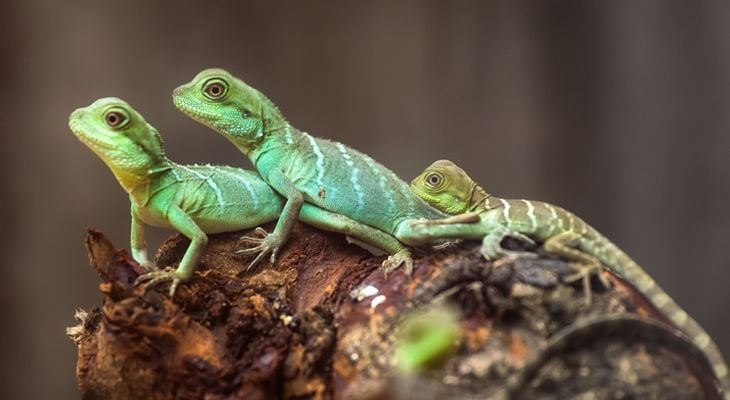Do you dread hitting the road with your pet? These tips may make the trip more comfortable and enjoyable for you both.
Read more

People with limited living quarters may find that reptiles such as lizards or turtles fit perfectly into their lifestyles. Before deciding on a reptile, learn as much as possible about them and their needs. Poisonous snakes and certain reptiles should never be kept as pets. Ask your veterinarian about the suitability of a particular animal before you make your decision. There are many things to consider before committing to a reptile as a pet.
Finding out if a Pet is Legal Where You Live
Many areas have enacted laws pertaining to keeping reptiles. Some are general and some are quite specific; in many places any reptiles that are considered dangerous (venomous snakes, alligators, etc.) are illegal but some places are even more restrictive (for example, in some states all constricting snakes including ball pythons are illegal).
Salmonella Risks and Prevention
All reptile owners need to be informed about Salmonella infections. While the risks shouldn't keep most people from keeping reptiles since with the proper management the risks are minimal. Still, owners should be aware of the risks, and the US Centers for Disease Control recommends that certain risk groups should be careful about contact with reptiles and amphibians.
The Importance of Light and Heat
Many problems with keeping reptiles can be traced back to not providing the proper environmental conditions, particularly heat. Proper lighting is also important for many reptiles. The equipment to provide the proper heat and light to captive reptiles is often quite expensive, but is absolutely essential to keeping pet reptiles healthy. It is important to find out exactly what conditions your reptile needs and never cut corners when it comes to meeting those conditions!
Why Choose Captive Bred Reptiles
There are numerous reasons why you should pick a captive bred reptile if at all possible, as explained here.
How to Pick a Healthy Reptile
It is important to keep in mind that depending on where you get a reptile, it may be very stressed, dehydrated, and prone to illness. Here are some items to look for when buying your reptile to increase the chances of picking out a healthy pet reptile.
While there are many types of reptiles that could be good pets, here we cover a few you could consider.
-
Tips for Traveling With Your Pet
Category: Newsletter Library
-
6 Questions to Ask At Your Senior Pet's Next Check Up
Category: Newsletter Library, Keeping Pets Healthy
Want to keep your senior pet healthy and happy? Ask these six questions at your pet's next check up.
Read more -
Pet Clothes: A Fashion Statement or a Necessity?
Category: Newsletter Library, Seasonal Topics
There is nothing cuter than a pet in a colorful sweater, but do our furry friends really need to wear clothing? Although clothing is not a necessity for every pet, some animals benefit from a little extra protection during cold or damp days. Others enjoy wearing festive clothing during holidays or other
Read more -
Put Some Teeth Into Your Pet’s Dental Care
Category: Newsletter Library, Keeping Pets Healthy
According to the American Animal Hospital Association, nearly two-thirds of pets suffer from dental problems because their owners do not provide dental care for them. Imagine what would happen to your own teeth if they were never brushed or examined by a dentist. The same thing can happen with your pet’s
Read more -
Is a Wet Nose a Sign of a Healthy Pet?
Category: Newsletter Library, Recognizing Illness
Have you ever heard that a wet nose is a sign that your pet is healthy? Although that's often the case, it's not always true. A moist nose can benefit your pet in several ways, but it doesn't necessarily guarantee good health. How Does a Wet Nose Help My Pet? Have you ever been woken at 5 a.m. by a cold,
Read more -
Obesity and Diabetes in Pets
Category: Newsletter Library, Keeping Pets Healthy
-
National Heartworm Awareness Month Focuses Attention on a Potentially Deadly Disease
Category: Newsletter Library, Keeping Pets Healthy
Heartworm disease can have a devastating effect on your pet's health. National Heartworm Awareness Month, observed annually in April, reminds pet owners about the health dangers this preventable disease poses for pets. What Are Heartworms? Thin, white heartworms look like cooked pieces of spaghetti.
Read more -
Keep Your Pets Calm During the Holiday Season with These Tips
Category: Newsletter Library, Behavior & Training
Although the holidays may be an exciting time of the year for you, your pets may find the festivities a little overwhelming. Even normally well-behaved pets can experience a little anxiety when their usual routines are disrupted. These tips will help you ensure that your furry friends truly enjoy the
Read more -
3 Reasons Why Your Pet Could Be Coughing
Category: Newsletter Library, Recognizing Illness
-
How Safe is Your Dog’s Food?
Category: Newsletter Library, Nutrition & Food
Over the last several years, numerous dog food brands and treats have been recalled for chemical contamination or Salmonella. This last summer many dog food brands were recalled due to Salmonella; all were manufactured in a Diamond Pet Foods plant in Gaston, South Carolina, USA. This plant makes many
Read more -
Wellness Coloring Book
Category: Pets4Kids
Picking the Right Pet, Welcome Your New Pet Home, Pets Need Proper Grooming, Feed Your Pet a Good Diet, Training Your Pet, Pets Love to Play!, and Pets Can Get Sick Just Like You.
Read more -
Can My Pet Get Depressed?
Category: Newsletter Library, Recognizing Illness
-
Does My Pet Dream?
Category: Newsletter Library, Newsletter Archive, Fun with Pets
Are humans the only mammals who dream? Find out if your pet experiences dreams and nightmares.
Read more -
Bloat in Dogs
Category: Newsletter Library, Recognizing Illness
-
Why is My Dog Vomiting?
Category: Newsletter Library, Recognizing Illness
Even healthy dogs vomit from time to time. Find out what causes the common health problem.
Read more -
Xylitol Poisoning in Dogs
Category: Newsletter Library, Pet Dangers
There are an increasing number of cases of dogs getting sick from ingesting a common sugar substitute, xylitol. This substance causes no problems in people, but in dogs it can cause wild fluctuations in blood sugar, often leading to a severe hypoglycemia. It can also cause liver failure. Xylitol is
Read more
Location
Find us on the map
Burlingame Veterinary Clinic
8511 SW Terwilliger Blvd.
Portland, OR, United States

